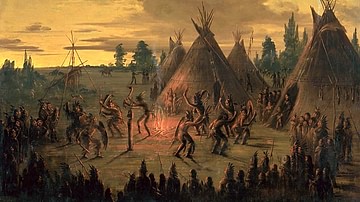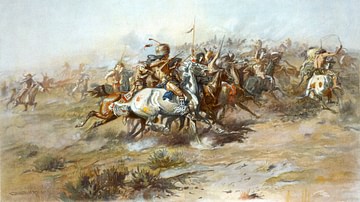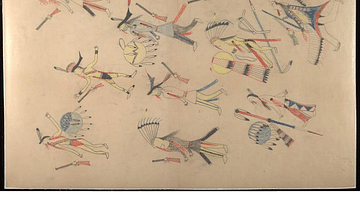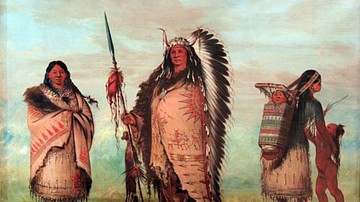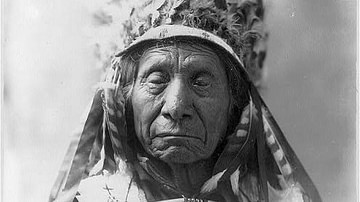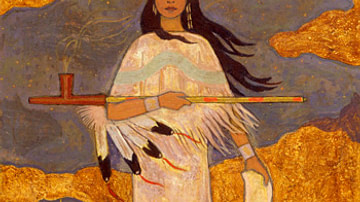White Plume is a hero tale of the Sioux nation featuring the supernatural trickster figure Unktomi (Iktomi) who serves as a catalyst for transformation, whether for good or ill. In this story, Unktomi is the villain whereas in others, such as The Bound Children, he is a force for good. The tale is among the most popular Sioux legends.

Text
The following is taken from Myths and Legends of the Sioux (1916) by Marie L. McLaughlin. It has been edited for space considerations, but the unabridged tale will be found below in the External Links section.
There once lived a young couple who were very happy. The young man was noted throughout the whole nation for his accuracy with the bow and arrow, and was given the title of "Dead Shot," or "He who never misses his mark," and the young woman, noted for her beauty, was named Beautiful Dove.
One day a stork paid this happy couple a visit and left them a fine big boy…Time passed, and the boy grew up to a good size, when one day his father said: "Wife, give our son the bow and arrows so that he may learn how to use them." The father taught his son how to string and unstring the bow, and also how to attach the arrow to the string. The red, blue and yellow arrows, he told the boy, were to be used only whenever there was any extra good shooting to be done, so the boy never used these three until he became a master of the art…
One day the boy came running into the tent, exclaiming: "Mother, mother, I have shot and killed the most beautiful bird I ever saw”…The parents decided to give a big feast in honor of their son killing the strange, beautiful bird…The guests soon arrived…The great chief and medicine men pronounced the bird "Wakan" (something holy)…[when the feast ended], the chief and councilmen bestowed upon the boy the title of White Plume.
One day, a stranger came to the village, who was very thin and nearly starved…After he had eaten and rested, he told his story.
"I came from a very great distance," said he. "The nations where I came from are in a starving condition. No place can they find any buffalo, deer nor antelope. A witch or evil spirit in the shape of a white buffalo has driven all the large game out of the country…Another evil spirit in the form of a red eagle has driven all the birds of the air out of our country…Many a marksman has tried his skill on this bird, all to no purpose…Another evil spirit in the form of a white rabbit has driven out all the animals which inhabit the ground, and destroyed the fields of corn and turnips, so the nation is starving, as the arrows of the marksmen have also failed to touch the white rabbit. Anyone who can kill these three witches will receive as his reward, the choice of two of the most beautiful maidens of our nation. The younger one is the handsomer of the two and has also the sweetest disposition. Many young, and even old men, hearing of this (our chief's) offer, have traveled many miles to try their arrows on the witches, but all to no purpose. Our chief, hearing of your great marksmanship, sent me to try and secure your services to have you come and rid us of these three witches."
Thus spoke the stranger to the hunter. The hunter gazed long and thoughtfully into the dying embers of the campfire. Then slowly his eyes raised and looked lovingly on his wife who sat opposite to him. Gazing on her beautiful features for a full minute he slowly dropped his gaze back to the dying embers and thus answered his visitor:
"My friend, I feel very much honored by your chief having sent such a great distance for me, and also for the kind offer of his lovely daughter in marriage, if I should succeed, but I must reject the great offer, as I can spare none of my affections to any other woman than to my queen whom you see sitting there."
White Plume had been listening to the conversation and when his father had finished speaking, said: "Father, I am a child no more. I have arrived at manhood. I am not so good a marksman as you, but I will go to this suffering tribe and try to rid them of their three enemies. If this man will rest for a few days and return to his village and inform them of my coming, I will travel along slowly on his trail and arrive at the village a day or two after he reaches there."
"Very well, my son," said the father, "I am sure you will succeed, as you fear nothing, and as to your marksmanship, it is far superior to mine, as your sight is much clearer and aim quicker than mine."
The man rested a few days and one morning started off, after having instructed White Plume as to the trail. White Plume got together what he would need on the trip and was ready for an early start the next morning. That night, Dead Shot and his wife sat up away into the night instructing their son how to travel and warning him as to the different kinds of people he must avoid in order to keep out of trouble. "Above all," said the father, "keep a good look out for Unktomi (spider); he is the most tricky of all, and will get you into trouble if you associate with him."
White Plume left early, his father accompanying him for several miles. On parting, the father's last words were: "Look out for Unktomi, my son, he is deceitful and treacherous."
"I'll look out for him, father;" so saying, he disappeared over a hill.
On the way he tried his skill on several hawks and eagles, and he did not need to use his painted arrows to kill them, but so skillful was he with the bow and arrows that he could bring down anything that flew with his common arrows. He was drawing near to the end of his destination when he had a large tract of timber to pass through. When he had nearly gotten through the timber, he saw an old man sitting on a log, looking wistfully up into a big tree, where sat a number of prairie chickens.
"Hello, grandfather, why are you sitting there looking so downhearted?" asked White Plume. "I am nearly starved and was just wishing someone would shoot one of those chickens for me, so I could make a good meal on it," said the old man. "I will shoot one for you," said the young man. He strung his bow, placed an arrow on the string, simply seemed to raise the arrow in the direction of the chicken (taking no aim). Twang went out the bow, zip went the arrow, and a chicken fell off the limb, only to get caught on another in its descent.
"There is your chicken, grandfather."
"Oh, my grandson, I am too weak to climb up and get it. Can't you climb up and get it for me?"
The young man, pitying the old fellow, proceeded to climb the tree, when the old man stopped him, saying: "Grandson, you have on such fine clothes, it is a pity to spoil them; you had better take them off so as not to spoil the fine porcupine work on them."
The young man took off his fine clothes and climbed up into the tree, and securing the chicken, threw it down to the old man. As the young man was scaling down the tree, the old man said: "Iyashkapa, iyashkapa," (stick fast, stick fast). Hearing him say something, he asked, "What did you say, old man?" He answered, "I was only talking to myself."
The young man proceeded to descend, but he could not move. His body was stuck fast to the bark of the tree. In vain did he beg the old man to release him. The old Unktomi, for he it was, only laughed and said: "I will go now and kill the evil spirits, I have your wonderful bow and arrows and I cannot miss them. I will marry the chief's daughter, and you can stay up in that tree and die there."
So saying, he put on White Plume's fine clothes, took his bow and arrows, and went to the village. As White Plume was expected at any minute, the whole village was watching for him, and when Unktomi came into sight the young men ran to him with a painted robe, sat him down on it and slowly raising him up they carried him to the tent of the chief. So certain were they that he would kill the evil spirits that the chief told him to choose one of the daughters at once for his wife. (Before the arrival of White Plume, hearing of him being so handsome, the two girls had quarreled over which should marry him, but upon seeing him the younger was not anxious to become his wife.) So Unktomi chose the older one of the sisters and was given a large tent in which to live.
The younger sister went to her mother's tent to live, and the older was very proud, as she was married to the man who would save the nation from starvation. The next morning, there was a great commotion in camp, and there came the cry that the white buffalo was coming. "Get ready, son-in-law, and kill the buffalo," said the chief.
Unktomi took the bow and arrows and shot as the buffalo passed, but the arrow went wide off its mark. Next came the eagle, and again he shot and missed. Then came the rabbit, and again he missed.
"Wait until tomorrow, I will kill them all. My blanket caught in my bow and spoiled my aim."
The people were very much disappointed, and the chief, suspecting that all was not right, sent for the young man who had visited Dead Shot's tepee. When the young man arrived, the chief asked: "Did you see White Plume when you went to Dead Shot's camp?"
"Yes, I did, and ate with him many times. I stayed at his father's tepee all the time I was there," said the young man.
"Would you recognize him if you saw him again?" asked the chief.
"Anyone who had but one glimpse of White Plume would surely recognize him when he saw him again, as he is the most handsome man I ever saw," said the young man.
"Come with me to the tent of my son-in-law and take a good look at him, but don't say what you think until we come away."
The two went to the tent of Unktomi, and when the young man saw him, he knew it was not White Plume, although it was White Plume's bow and arrows that hung at the head of the bed, and he also recognized the clothes as belonging to White Plume. When they had returned to the chief's tent, the young man told what he knew and what he thought.
"I think this is some Unktomi who has played some trick on White Plume and has taken his bow and arrows and also his clothes, and hearing of your offer, is here impersonating White Plume. Had White Plume drawn the bow on the buffalo, eagle, and rabbit today, we would have been rid of them, so I think we had better scare this Unktomi into telling us where White Plume is," said the young man.
"Wait until he tries to kill the witches again tomorrow," said the chief.
In the meantime, the younger daughter had taken an axe and gone into the woods in search of dry wood. She went quite a little distance into the wood and was chopping a dry log. Stopping to rest a little she heard someone saying: "Whoever you are, come over here and chop this tree down so that I may get loose."
Going to where the big tree stood, she saw a man stuck onto the side of the tree. "If I chop it down the fall will kill you," said the girl. "No, chop it on the opposite side from me, and the tree will fall that way. If the fall kills me, it will be better than hanging up here and starving to death," said White Plume, for it was he.
The girl chopped the tree down and when she saw that it had not killed the man, she said: "What shall I do now?"
"Loosen the bark from the tree and then get some stones and heat them. Get some water and sage and put your blanket over me." She did as told and when the steam arose from the water being poured upon the heated rocks, the bark loosened from his body and he arose. When he stood up, she saw how handsome he was.
"You have saved my life," said he. "Will you be my wife?"
"I will," said she.
He then told her how the old man had fooled him into this trap and took his bow and arrows, also his fine porcupine worked clothes, and had gone off, leaving him to die. She, in turn, told him all that had happened in camp since a man, calling himself White Plume, came there and married her sister before he shot at the witches, and when he came to shoot at them, missed every shot. "Let us make haste, as the bad Unktomi may ruin my arrows."
They approached the camp and whilst White Plume waited outside, his promised wife entered Unktomi's tent and said: "Unktomi, White Plume is standing outside, and he wants his clothes and bow and arrows."
"Oh, yes, I borrowed them and forgot to return them; make haste and give them to him."
Upon receiving his clothes, he was very much provoked to find his fine clothes wrinkled and his bow twisted, while the arrows were twisted out of shape. He laid the clothes down, also the bows and arrows, and passing his hand over them, they assumed their right shapes again.
The daughter took White Plume to her father's tent and, upon hearing the story, he at once sent for his warriors and had them form a circle around Unktomi's tent, and if he attempted to escape to catch him and tie him to a tree, as he (the chief) had determined to settle accounts with him for his treatment of White Plume, and the deception employed in winning the chief's eldest daughter.
About midnight, the guard noticed something crawling along close to the ground and seizing him found it was Unktomi trying to make his escape before daylight, whereupon they tied him to a tree. "Why do you treat me thus," cried Unktomi, "I was just going out in search of medicine to rub on my arrows, so I can kill the witches." "You will need medicine to rub on yourself when the chief gets through with you," said the young man who had discovered that Unktomi was impersonating White Plume.
In the morning, the herald announced that the real White Plume had arrived, and the chief desired the whole nation to witness his marksmanship. Then came the cry: "The White Buffalo comes." Taking his red arrow, White Plume stood ready. When the buffalo got about opposite him, he let his arrow fly. The buffalo bounded high in the air and came down with all four feet drawn together under its body, the red arrow having passed clear through the animal, piercing the buffalo's heart. A loud cheer went up from the village.
"You shall use the hide for your bed," said the chief to White Plume.
Next came a cry, "The eagle, the eagle." From the north came an enormous red eagle. So strong was he, that as he soared through the air his wings made a humming sound as the rumble of distant thunder. On he came, and just as he circled the tent of the chief, White Plume bent his bow, with all his strength drew the arrow back to the flint point and sent the blue arrow on its mission of death. So swiftly had the arrow passed through the eagle's body that, thinking White Plume had missed, a great wail went up from the crowd, but when they saw the eagle stop in his flight, give a few flaps of his wings, and then fall with a heavy thud into the center of the village, there was a greater cheer than before.
"The red eagle shall be used to decorate the seat of honor in your tepee," said the chief to White Plume.
Last came the white rabbit. "Aim good, aim good, son-in-law," said the chief. "If you kill him, you will have his skin for a rug." Along came the white rabbit, and White Plume sent his arrow in search of rabbit's heart, which it found, and stopped Mr. Rabbit's tricks forever.
The chief then called all of the people together and before them all took a hundred willows and broke them one at a time over Unktomi's back. Then he turned him loose. Unktomi, being so ashamed, ran off into the woods and hid in the deepest and darkest corner he could find. This is why Unktomis (spiders) are always found in dark corners, and anyone who is deceitful or untruthful is called a descendant of the Unktomi tribe.
